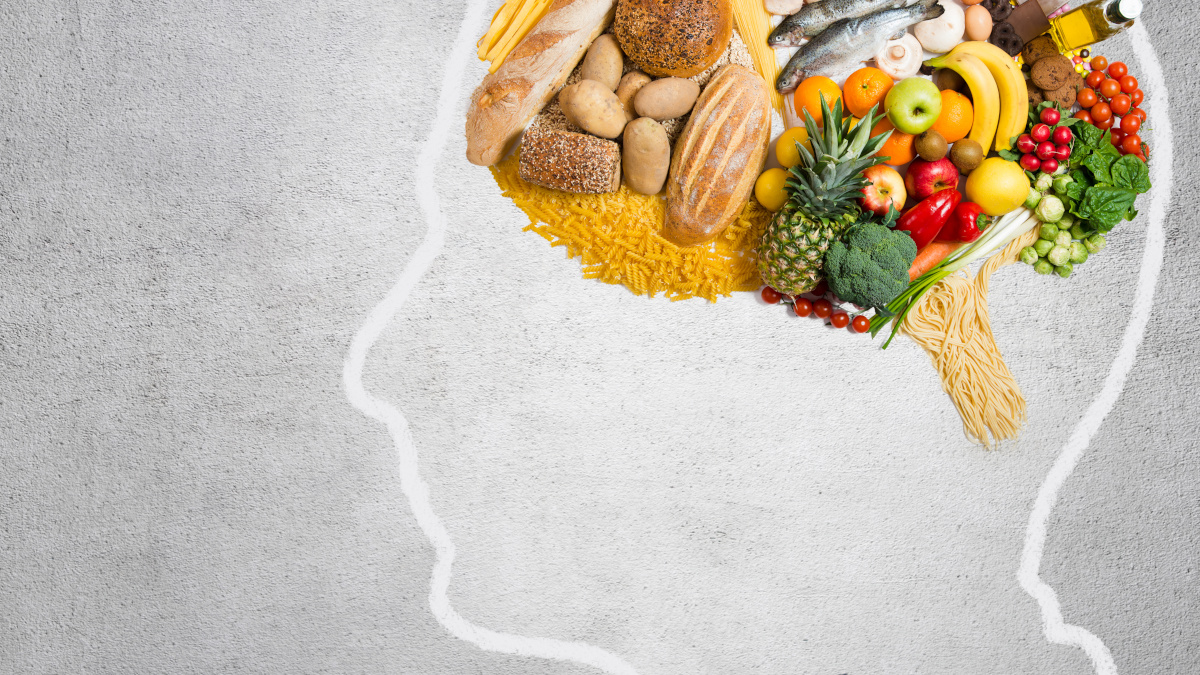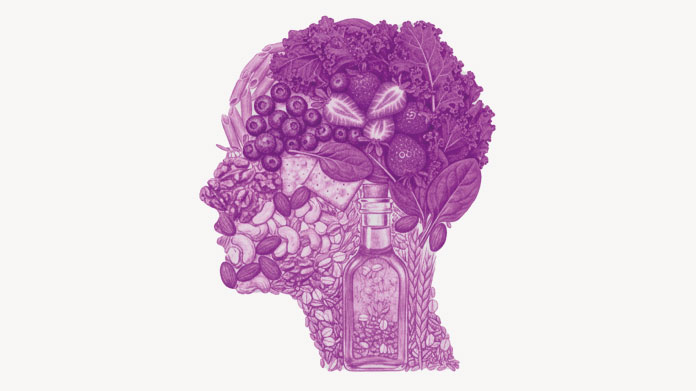MIND diet: recipes that help protect the brain
Have you heard of the MIND diet? It’s a set of dietary practices designed to promote good brain health. Put it into practice with our recipe suggestions.

What is the MIND diet?
Developed by American epidemiologist Martha Clare Morris, the MIND diet (Mediterranean-DASH Intervention for Neurodegenerative Delay) is designed to both prevent cognitive decline, especially age-related memory problems, and optimize brain performance more generally (1).
It combines the best elements of two diets widely-acclaimed by the scientific community: the DASH diet (recommended for lowering high blood pressure and losing weight), and the Mediterranean diet (which protects the heart and blood vessels). With the correct nutrition and blood supply, the brain can function at full capacity.
Created in opposition to restrictive diets (which can be bad for our health), the MIND diet advocates the long-term adoption of a range of good nutritional habits for taking care of the brain. It reflects all the key principles of a balanced diet, and thus prevents any deficiencies.
Which foods should be prioritised?
Simply put, the MIND diet emphasises the consumption of raw ingredients, minimal salt (as it adversely affects blood pressure) and minimal saturated fats (which in excess, promote cardiovascular disease) (2-3). Thus, processed, fried and ‘fast-foods’ are all off-limits, and intake of butter, cheese and processed meats should be restricted.
Fats
Did you know the brain is one of the ‘fattiest’ organs in the body? Fats (or lipids) play a major structural role in the brain, in that they constitute the myelin sheath, the protective layer around nerve cells. A good intake of omega-3s, which the body is unable to make, is therefore essential (4).
Found in nut and rapeseed oils, as well as linseeds and chia seeds, these essential fatty acids are also major components of seafood in the form of DHA and EPA. These two omega-3s also help to maintain normal blood pressure. Opt for smaller fish (sardines, herrings, mackerel…) as they accumulate fewer brain-harmful heavy metals.
An excellent way of optimising your daily intake of these invaluable omega-3s is to supplement with EPA and DHA (try Arctic Plankton Oil, obtained from calanus oil, a species of zooplankton totally free from heavy metals) (5).
What about other types of fat? Always try to cook with olive oil, the indisputable star of the Mediterranean diet, with a high content of monounsaturated fatty acids. In addition, sprinkle a few nuts (almonds, hazelnuts, Brazil nuts…) on your dishes, or slivers of avocado.
Protein
Protein-wise, lean poultry (chicken, turkey, duck …) are all foods to include because of their content both of amino acids, involved in neurotransmitter synthesis, and iron which supports the transport of oxygen in the body (6). Conversely, consumption of red meat should be restricted to a maximum of once a week).
Carbohydrates
The brain also consumes a significant amount of glucose, around 5g an hour! However, it doesn’t like to be fed it in fits and starts. So focus on eating slow-release complex carbohydrates found in wholegrains and pulses, rather than fast-acting sugars which produce sudden peaks in blood glucose levels (sweets, fizzy drinks, sweeteners…)
With a high content of vitamins and minerals, green vegetables (cabbage, spinach, Swiss chard, salad leaves …) are very much center stage in the MIND diet (7). They are also high in fibre, a type of non-digestible carbohydrate which directly reaches the gut flora – indeed, the link between the microbiota and the brain continues to attract huge scientific interest (8).
As a back-up, you could opt for a soluble fibre supplement to support your microbiota (such as Organic Acacia, an organic acacia gum extract, very well-tolerated by the digestive system) (9).
For dessert, feast on berries (strawberries, raspberries, blueberries …) which contain anthocyanins and vitamin C. These fruits are delicate, however, and need to be eaten soon after purchase. For an easy way to benefit from their properties, you could take a highly-concentrated berry extract (such as Wild Maqui Berry, an extract of wild maqui berry, exceptionally rich in polyphenols and anthocyanins). (10)
Last but not least, remember to drink plenty of water! Even slight dehydration can significantly affect brain capacity (11).
Two MIND recipes to boost your brainpower
Recipe 1: quinoa, shrimp and broccoli salad
Cook half a cup of quinoa according to the instructions on the packet. Remove the shells from 10 cooked shrimps. Break 150g of broccoli into florets and steam for 10 minutes.
Make a vinaigrette by mixing together 1 tbsp of olive oil with a squeeze of lemon juice and, if liked, a crushed garlic clove.
Assemble all the ingredients on a plate, drizzle with the vinaigrette and sprinkle with chopped coriander.
Recipe 2: chia and pomegranate pudding
The day before, mix 2 tbsp of chia seeds with 125ml of oat milk, stirring for 2 minutes. Leave to rest in the fridge overnight.
The next day, sprinkle generously with pomegranate seeds, diced kiwi and raisins.
MIND diet: example of a day’s menu
Adjust the quantities according to age, sex and level of physical activity.
Breakfast:
Home-made muesli (40g of oat flakes + half a banana + a handful of cranberries + 10 walnuts)
+ 125 ml of unsweetened plant milk
Lunch:
100g of grated carrot + 1 tsp of rapeseed oil
100g of grilled sardines + 65g of wholewheat spaghetti (uncooked weight) + 200g of spinach + 1 tsp of olive oil
1 fromage blanc with raspberry coulis
Dinner:
1 bowl of creamy pea and courgette soup
Salad of green lentils (70g uncooked weight), onion and parsley + 1 tbsp of walnut oil + 1 tsp of cider vinegar
1 ramekin of apple and cinnamon compote
MIND diet and nutritional supplements
In addition to the previously-mentioned Arctic Plankton Oil, Wild Maqui Extract and Organic Acacia, there are other supplements that combine well with the MIND diet:
- vary your berry-based formulations for a greater diversity of beneficial phytonutrients (try Schisandra Chinensis, an extract of schisandra berry with adaptogen properties (12), or Goji Berry, with extract of goji berry, sometimes called the ‘fruit of eternal youth’ (13));
- try moringa leaves, which contribute to glucose breakdown and help maintain normal blood sugar levels (14), which, as we’ve seen, is a factor in optimal brain function (you can find them in Organic Moringa, an organic moringa leaf supplement) ;
- consider taking potassium, which helps maintain normal blood pressure (15) and is completely consistent with the DASH element of the MIND diet (you’ll find it in Tensix, where it’s combined synergistically with celery seed, magnesium and hawthorn, a plant that supports good cardiovascular health).
References
- Morris MC, Tangney CC, Wang Y, Sacks FM, Bennett DA, Aggarwal NT. MIND diet associated with reduced incidence of Alzheimer's disease. Alzheimers Dement. 2015;11(9):1007-1014. doi:10.1016/j.jalz.2014.11.009
- Grillo A, Salvi L, Coruzzi P, Salvi P, Parati G. Sodium Intake and Hypertension. Nutrients. 2019;11(9):1970. Published 2019 Aug 21. doi:10.3390/nu11091970
- Briggs MA, Petersen KS, Kris-Etherton PM. Saturated Fatty Acids and Cardiovascular Disease: Replacements for Saturated Fat to Reduce Cardiovascular Risk. Healthcare (Basel). 2017;5(2):29. Published 2017 Jun 21. doi:10.3390/healthcare5020029
- Dyall SC. Long-chain omega-3 fatty acids and the brain: a review of the independent and shared effects of EPA, DPA and DHA. Front Aging Neurosci. 2015;7:52. Published 2015 Apr 21. doi:10.3389/fnagi.2015.00052
- von Schacky C. Importance of EPA and DHA Blood Levels in Brain Structure and Function. Nutrients. 2021;13(4):1074. Published 2021 Mar 25. doi:10.3390/nu13041074
- Institute of Medicine (US) Committee on Military Nutrition Research. The Role of Protein and Amino Acids in Sustaining and Enhancing Performance. Washington (DC): National Academies Press (US); 1999. 14, Amino Acid and Protein Requirements: Cognitive Performance, Stress, and Brain Function. Available from: https://www.ncbi.nlm.nih.gov/books/NBK224629/
- Morris MC, Wang Y, Barnes LL, Bennett DA, Dawson-Hughes B, Booth SL. Nutrients and bioactives in green leafy vegetables and cognitive decline: Prospective study. Neurology. 2018;90(3):e214-e222. doi:10.1212/WNL.0000000000004815
- Mohajeri MH, La Fata G, Steinert RE, Weber P. Relationship between the gut microbiome and brain function. Nutr Rev. 2018 Jul 1;76(7):481-496. doi: 10.1093/nutrit/nuy009. PMID: 29701810.
- Jarrar AH, Stojanovska L, Apostolopoulos V, et al. The Effect of Gum Arabic (Acacia Senegal) on Cardiovascular Risk Factors and Gastrointestinal Symptoms in Adults at Risk of Metabolic Syndrome: A Randomized Clinical Trial. Nutrients. 2021;13(1):194. Published 2021 Jan 9. doi:10.3390/nu13010194
- Bribiesca-Cruz I, Moreno DA, García-Viguera C, Gallardo JM, Segura-Uribe JJ, Pinto-Almazán R, Guerra-Araiza C. Maqui berry (Aristotelia chilensis) extract improves memory and decreases oxidative stress in male rat brain exposed to ozone. Nutr Neurosci. 2021 Jun;24(6):477-489. doi: 10.1080/1028415X.2019.1645438. Epub 2019 Jul 28. PMID: 31354109.
- Zhang N, Du SM, Zhang JF, Ma GS. Effects of Dehydration and Rehydration on Cognitive Performance and Mood among Male College Students in Cangzhou, China: A Self-Controlled Trial. Int J Environ Res Public Health. 2019;16(11):1891. Published 2019 May 29. doi:10.3390/ijerph16111891
- Zhang M, Xu L, Yang H. Schisandra chinensis Fructus and Its Active Ingredients as Promising Resources for the Treatment of Neurological Diseases. Int J Mol Sci. 2018;19(7):1970. Published 2018 Jul 6. doi:10.3390/ijms19071970
- Ruíz-Salinas AK, Vázquez-Roque RA, Díaz A, Pulido G, Treviño S, Floran B, Flores G. The treatment of Goji berry (Lycium barbarum) improves the neuroplasticity of the prefrontal cortex and hippocampus in aged rats. J Nutr Biochem. 2020 Sep;83:108416. doi: 10.1016/j.jnutbio.2020.108416. Epub 2020 May 17. PMID: 32554223.
- Krishna GG. Effect of potassium intake on blood pressure. J Am Soc Nephrol. 1990 Jul;1(1):43-52. doi: 10.1681/ASN.V1143. PMID: 2104250.
Keywords
1 Days
repeat customer
recommended by my doctor. easy to create an account. Discounts and specials are appreciated. packaging and delivery is dependable. Capsules easy to digest. I've had some some capsules and tablets that are broken inside their bottles.
Kokee
5 Days
Order was shipped on time and packaged…Wonderful Jobs!
Order was shipped on time and packaged excellently.
DMHoge
11 Days
great products and prices
great products and prices
Marie
17 Days
Easy to navigate site
Easy to navigate site, had what I was searching for, good price. easy order-check out
James Tucker
23 Days
My skin is clearing up nicely!
Pretty good for my skin so far.
Christian
26 Days
The new packaging is excellent
The new packaging is excellent - finally! No more squashed boxes and torn envelopes.
GORAN
26 Days
Great Product
Great Product
Larry Garrett
31 Days
Quick shipping
Quick shipping; good price. No issues!
Mary McCarty
32 Days
Thr product is very good and is helping…
Thr product is very good and is helping me on my health. Then is always on time
LUGO Luz
35 Days
Buying was fine
Buying was fine. I had problems with the website not recognizing my login info, and had to call to get it fixed. Other than that, everything was good.
David S. Clark
35 Days
Your super maca and super ginseng are…phenomenal
Your super maca and super ginseng are phenomenal supplements that compliment each other when taking them together. Fantastic feeling of well-being and lots of mid day energy without the crash.
Keith Mason
38 Days
I have had amazing results with every…
I have had amazing results with every supplement I've purchased. I am extremely satisfied with this company
kirstin Torres
38 Days
Fine products
Fine products . They are on the leading edge of online supplements. The only issue -so far-is they sometime run out of subscription items.
Jason Argos
41 Days
The ordering process is very user…
The ordering process is very user friendly and the products always come in a timely manner.
CARTER Rhonda
42 Days
The price for Dr
The price for Dr. Pero's AC-11 is reasonable and in line with his views. (my former colleague). Keep it pure.
CAMPBELL Clayton




